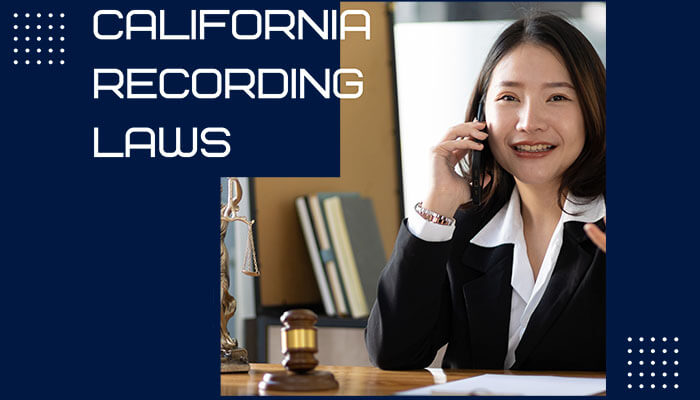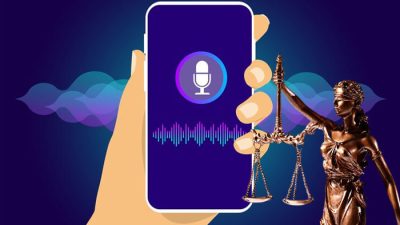Can you record a conversation in California? Yes, but there are California recording laws that are essential to control the usage of audio and video recordings in the state. These laws aim to protect individual privacy while trying to record in specific situations. You can prevent possible legal issues and make sure that you respect other people’s rights when recording conversations or events as an individual or business by knowing about California’s recording laws. Is California a Two Party Consent state? Yes, Let’s know the details in this article.
Is California a Two Party Consent State?
California is a two-party consent state, that means everyone must agree before recording a private conversation or phone call. This rule is applied to both audio and video recordings. It is illegal to use any device to listen in on or eavesdrop on a private conversation without the consent of everyone involved. Serious consequences, including possible criminal prosecution, may result from violating this law.
Types of recordings covered by California Law:
According to Section 632 of the California Penal Code, Unlawful recording is a crime that “Any individual who, willfully and without the consent of all parties uses an electronic amplifying or recording device to eavesdrop upon or record the confidential interaction, whether the conversation is carried on among the parties in the presence of one another or by means of a telegraph, telephone, or other device, except a radio, will be punished.”
This statute makes it clear that if the communication is confidential, the law covers almost all forms of recording. Unless there are particular California recording laws exceptions, like when the conversation takes place in an area where there is an opportunity that someone may hear and it also defines private conversations as those that are made under any circumstances that reasonably indicate either party intends for it to be a private discussion.
Unless all parties involved provide their consent, it is illegal to record a communication that is considered as confidential. The following are some examples of particular categories of covered communications:
- Face-to-face interactions
- Zoom meetings
- Phone calls and conversations on any other device, except for a radio.
California’s implementation of this rule classifies it as a two-party consent state. Without the consent and agreement of all parties, recording a discussion is illegal, even if one of them is involved in it.
When is it legal to record a conversation in California without their consent?
According to California law, one participant may record a private conversation if they have sufficient evidence to think the recording could prove certain serious crimes. These include extortion, kidnapping, bribery, any violent felony, violations related to harassment, domestic violence.
According to Sections 236.1 and 13700 of the Penal Code, recording is allowed in such instances in order to obtain evidence against the other party who is involved in the crime.
Other Exceptions of California Recording Laws:
1. Public conversation: It might be allowed to record without consent if the discussion takes place in a public place where people do not reasonably expect privacy. But it is important to use caution and make sure that no other rules or laws are violated.
2. Law enforcement: In California, law enforcement agencies are legally permitted to use electronic surveillance methods, such as wiretapping and recording conversations, as part of their investigations. These actions are often governed by certain legal requirements and procedures.
3. Personal safety: According to California law, anyone may record conversations without consent if they have an excellent reason to think it will protect them or others safely.
4. Protection of rights and evidence: In certain circumstances, recording conversations without consent may also be allowed if it is done to protect one’s rights or gather evidence.
5. Journalistic purposes: California recognizes that journalists may have specific privileges and protections when it comes to recording conversations while carrying out their duties, even in the situations when both parties have provided their agreement. Journalists must, however, uphold ethical standards and balance the potential intrusion of privacy against the public interest.
6. Consent given: It is acceptable to record a conversation without obtaining further consent provided all participants are aware of it and give their consent. In criminal circumstances, the recordings can usually be used as evidence with consent.
Penalties for Violating California Recording Laws:
The consequences for illegally recording a confidential conversation are outlined in California Penal Code Section 632. Potential consequences include:
- Fines up to $2,500 per violation
- Imprisonment in county jail for up to year
- Imprisonment in state prison
More severe punishments are carried out to repeat offenders, which can include fines of up to $10,000 and a year in jail.
Legal Defenses against Recording Violations:
If you have been accused of violating California’s recording laws, you have a wide range of defenses at your disposal. Here are a few examples of these defenses:
1. Not a private conversation: If you can demonstrate that the other party’s expectations of privacy were unreasonable, you should not be found guilty.
2. Lack of intent: If you unintentionally record a conversation, you shouldn’t be charged.
3. Consent of the other party: If the other party consents to be recorded, you won’t be punished.
4. Gathering evidence of a crime: Not only police can record private conversations to gather evidence of violent felonies, extortion, kidnapping, or bribery.
5. Statute of limitations: In some cases, private citizens may also record a private conversation to obtain evidence of these crimes; if too long a time has passed since the incident, the case against you may be time-barred.
If you have been believed in breaking California’s recording laws, you should contact a criminal defense lawyer immediately so that they can help you to fight accusations.
Conclusion:
I hope this article helps you to know about California recording laws and answer the query, ‘Is California a two party consent state?’ Individuals in California have significant protections against being recorded without their consent. People who break the law may face criminal and civil penalties. If you are involved in a lawsuit, speak with one of our lawyers to know about your legal rights and risks.





